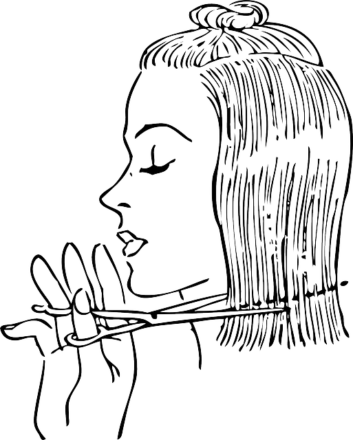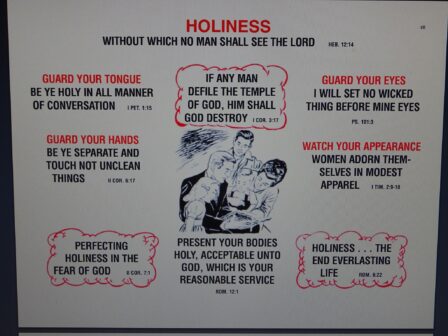Many of you know that Search for Truth is a home Bible study usually given to new converts. There is also Search for Truth II. Surprisingly to outsiders or those coming into Oneness Pentecost (OP), there is little teaching on what is called “holiness standards.” (When an OP person says “holiness standards” they are often referring to the dress code).
Most of the teaching in SFT is Bible teaching and teaching on the OP view of salvation and what it takes to be saved. In all of Search for Truth 1, there is one chart, and one page explaining this chart, on holiness in the teacher’s manual. This is out of 61 teaching charts for the student and the 133 page teacher’s manual. So, something that seems very central to OP teaching is more or less in OP teachings, a sideline. This can be confusing and perplexing to both outsiders and new converts. In Search for Truth #1, there is no teaching whatsoever on particular standards. In the chart shown in the photo, the emphasis is on holiness, separation and not touching the unclean thing. There is one quoted scripture about clothing, 1 Tim. 2:9-10 and it says “Watch Your Appearance – Women adorn themselves in modest apparel.” So, at this point the student is taught biblical principles only, and no specifics, at least as far as the charts themselves are concerned.
Once a person has been taught 10 weeks of Bible study according to OP doctrine, they sometimes start Search for Truth II. This is 12 more weeks of Bible Study. There is a mild teaching about separation-talking about the Jews, in lesson 4, chart 4 called “Holy People, Separated Unto God.” Then, there is much more Bible teaching about many things-dispensations, the New Covenant, etc. Only when you come to lesson 9-Chart 6 does Search for Truth begin to address any dress standards. So, the student has been sitting through at least 18 lessons before the subject is taught on in any depth.
First, the chart says “A Holy People, Separated Unto God.” Does this sound familiar? That’s because it is the exact same title mentioned before, on the lesson about the Jews being separate unto God, only this time, it’s about the Christian. Again, the focus is on the principles and about how Christians are to be separate from the world. After this foundation is laid, the author goes into Practical Application (in the teacher’s manual). Here’s where the actual clothing standards begin to be addressed.
The first thing mentioned is legalism. They define the legalist as someone who has no genuine love for God but just follows rules, so they head off the argument against legalism right away. This can and does happen (someone just following rules), as we have seen in cases where some who completely follow all these dress rules have affairs or do other things like them. Surprisingly, the OP movement believes that these rules are somewhat of a measuring stick to your spirituality, which is surprising since they admit you can follow them without following God. In speaking of legalists the author writes: “By obeying certain “holiness standards,” they hope to satisfy God’s legal requirements, thus earning their salvation.” (pg 210) What the OP movement does not admit to though, is that they believe, mostly, that you can’t follow God without following these rules.
There is teaching on not sinning “with your eyes.” I find it interesting what is all lumped together here: “By reading material that emphasizes pornography, nudity, sensual love stories, monsters, crime, violence, the occult or witchcraft.” (pg 211) So, apparently reading a monster story or a crime novel is akin to watching pornography, which makes little sense. It does suggest making personal determinations, which is valid. It goes on about not sinning with your ears (it mentions rock music and country music- which in my experience was an OP favorite- one of those contradictions that no one wants to address).
The lesson goes on. Don’t love the world. Finally, dress is mentioned. It says “When we look for scriptural principles, we find that they apply to every culture and every age.” (pg 211) Any Christian will agree with that statement! “Immodest apparel, then, would be any clothing which by its brevity or tightness reveals the body in a way that entices the opposite sex with lustful thought and desires.” (pg 211) Any Christian would also agree with this statement.
“To the women he (Paul) says: dress modestly, with moderation; do not wear gold, pearls and costly array.” This lesson seems to do a good job at teaching principles so far, but the definitions will come later in the lesson and in the actual church culture. “A woman’s clothing should be modest, rather than expensive and flashy, and that she should avoid extravagant adornment.” (pg 212) “Make-up could also fit this category…..several OT passages describe women who wore make-up…always they were depicted as evil, unfaithful, adulterous women. The badge of their wicked ways was adornment of jewels and make-up.” I think the writer forgot to mention Proverbs 31:22 “She maketh herself coverings of tapestry; her clothing is silk and purple.” and Proverbs 25:12 “As an earring of gold, and an ornament of fine gold, so is a wise reprover upon an obedient ear.” Notice this doesn’t say, as a Jezebel wanting to seduce her lover, so is a reprover upon an obedient ear but it speaks of jewelry in a positive light. Or Song of Solomon 1:10 “Thy cheeks are comely with rows of jewels, thy neck with chains of gold.”
(Here are some of the lessons in the actual OP church culture, which I want to mention but are not mentioned in these lessons: Don’t wear gold in the form of a necklace or earrings, but wedding rings, buttons, tie tacks, cuff links, and hair decorations are all okay. Don’t wear pearls in the form of a necklace but pearls as buttons and in the hair are okay. Costly array, well, we never bother worrying about that one, especially at General Conference).
The problem is not the teaching of the actual principle. The principles are valid for all cultures and all times, just like was said in the beginning of the lesson….the problem is that the author begins to take personal preferences and interject them into the lesson, according to OP culture, leaving out anything that teaches a possible different view of scripture. As authors before him, he begins to take scriptures, make implications and suggestions and then drives it home with “Regardless of our preferences, God’s opinion concerning make-up and jewelry is what matters most! We want to please him!” This is a true statement when it stands alone. However, when implications are made that make-up and jewelry are wrong, scriptures are given to “prove” it (omitting any scripture to the contrary) and then the statement is made about “God’s opinion” and it leads the student to believe that OP cultural tradition is the same as God’s opinion, and that if you don’t follow OP culture and tradition, you don’t want to please God!
The lesson continues. Deuteronomy 22:5 is quoted and the first thing the writer writes is “An abomination is something that God hates!” (pg 212) This sets the student up to know that they certainly don’t want to dress like the opposite sex or they will be an abomination to God. Then, the definitions begin. The author writes about a male pastor preaching in a dress and that in another 50 years women’s clothing will be acceptable for men. The student, seeing the obvious shift in society, likely agrees. The author then leads in. “Eighty years ago, a woman wearing pants was labeled indecent and ungodly. Society has changed but God’s Word has not!”
The author leads the student right into the idea that God’s Word is being broken if a woman wears pants. However, Deut. 22:5 doesn’t say anything about pants. Deut 22:5 teaches a principle that a person should not wear that which pertains to the opposite sex. When a woman wears pants, does most of society believe she is wearing men’s apparel? No. Even in our society today, there are clear cut ways to show you want to dress as a member of the opposite sex. A clear message can be given. A woman in pants does not give this message even though it did give that message eighty years ago.
The author drives home more about “abomination(s) to God.” The author talks about different nations having different customs and says “Yet a distinction exists between the clothing of each sex. At a distance one person should be able to tell whether a person is male or female by their clothing. A unisex culture with no immediately observable difference in apparel is immoral!” Well, I can usually tell a man from a woman in our culture. Those that I can’t are usually intentionally not making it apparent.
The author then says we are reaping the harvest of confusing the roles of male and female in their clothing. “Men are acting like women and women like men; homes are breaking up; homosexuality is on the rise; children are being raised in a culture where they cannot determine their proper roles”. (pg 212) So, the insinuation is made that broken homes and homosexuality being on the rise are at least partially the fault of women who won’t wear skirts daily.
The writer then goes on to talk about hair length. The author writes immediately about “long, uncut hair” on a woman, quoting 1 Cor 11:13-16 (pg 212), leaving the reader to believe that long equals uncut in no uncertain terms, leaving no room for any other interpretation.
The lesson ends with a summary of principles and presenting our bodies as a living sacrifice. It leaves the student with a mind-spinning menagerie of things to think through. Mostly, it leaves the student with these ideas: If you want to serve God, not be an abomination to Him, please Him and live for Him you need to: 1. Wear dresses as a female 2. Not wear make-up or certain jewelry 3. Not cut your hair as a woman and have short hair as a man 4. Do these things to present your body as a living sacrifice and be a separate and holy person.
One reason there is so much fear surrounding questioning these definitions is that a woman (or man) must deal with these ideas: If I question, am I moving towards being an abomination to God? Am I contributing to divorce and homosexuality in our culture? Am I refusing to submit to those that have the rule over me?
Sometimes when a person reads Deut 22:5: “The woman shall not wear that which pertaineth unto a man, neither shall a man put on a woman’s garment: for all that do so are abomination unto the LORD thy God,” they actually see or hear in their head: “The woman shall not wear pants and men shall not wear skirts for all that do so are an abomination to God.” But that’s not actually what the verse says. Many of the other “holiness” teachings are like-wise. Then sins like infidelity, molestation and extortion get sometimes (unintentionally, usually) overlooked, while a woman gets scorned for wearing a necklace. It becomes a false balance. And what is a false balance? “A false balance is abomination to the LORD: but a just weight is his delight.” Proverbs 11:1
Here are some links for the Search for Truth PDF’s:
SFT I Chart: https://search4truth2.com/DOCs/study/search4truth1-chart.pdf
SFT I Teacher’s Manual: http://omsify.com/resources/pdfs/SFT1-MAN.pdf
SFT II Chart: https://mballestero.files.wordpress.com/2011/09/sft2chts.pdf
SFT II Teacher’s Manual: http://www.fullertonpentecostals.com/uploads/2/0/0/4/20047357/sft2man.pdf
SFT #1 was originally copyright in 1965 by Search For Truth and was later revised by the UPC in 2003.
SFT #2 was originally Light For Living that was written by Jerry Twentier and Marcella Willhoite in 1985. It was later revised in 2003 by J. L. Hall, Kenneth Haney, Philip Dugas, and Nathaniel Haney.
(Written for the Facebook Group-Breaking Out.)
Getting Out the Old Books: The Literal Word by M.D. Treece
Getting Out the Old Books: Guardians of His Glory by Gary & Linda Reed
Getting Out the Old Books: David F. Gray
Getting Out the Old Books: Joy Haney
Getting Out The Old Books: Larry L. Booker
Getting Out the Old Books: Power Before the Throne
Getting Out the Newer Books: Wholly Holy: The Vital Role of Visible Devotion
Search For Truth On Holiness
********
Shop at our Amazon store! As an Amazon Influencer, this website earns from qualifying purchases.




